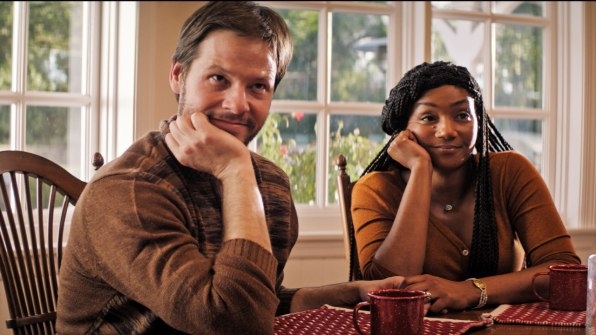The first Thanksgiving after Donald Trump was elected president, comedian and actor Ike Barinholtz found himself in a shouting match with his family. It wasn’t until the next morning that he realized everyone involved in the argument actually voted for the same person.
“I was like, if that’s happening at this relatively friendly table, what’s going on at other tables around the country?” Barinholtz says. “And as I started talking to friends of mine and hearing their horror stories, I knew that the landscape of the American holiday table was done as we know it. I knew that there was something scary, very funny, and just kind of absurd about the climate we were all in and how we were getting our news and how we were processing our news and sharing our news with each other. And so I wanted to take that claustrophobic, awkward feeling of being in the house and blow up.”
And blow it up he did.
Barinholtz wrote, directed, and stars in The Oath, a dark comedy that imagines a world where citizens have to sign, yes, an oath swearing their allegiance to the country and its government. It’s a voluntary measure–until it’s not. Barinholtz plays Chris, a far-left liberal going toe-to-toe with everyone around him who’s signing the oath. As one of the last holdouts, Chris and his wife (Tiffany Haddish) find themselves under siege with government agents who just want “to talk.”
Although the plot uses the country’s current climate of extreme polarization as its base, Barinholtz says he had no intention of making a partisan film.
“This is for Americans who are not so dug into their side that they still are tethered to reality. I’m a liberal myself and personally I would love to be able to say that it’s only the far, far right that’s completely disconnected–that’s not really true,” he says. “[The Oath is] for people who want some catharsis and they’re sick of not just the political climate, but the way it’s permeated every aspect of our culture.”
Barinholtz was careful to pull out the nuances of political discourse within families while also showing the flaw in extreme thinking on both sides. His character embodies the blind righteousness some liberals have been accused of, while the government task force agent Mason (Billy Magnussen) is the epitome of alt-right rage. In between that spectrum are characters on both sides looking at the bigger picture. For example, Mason’s partner Peter (John Cho) is a foil to Mason but still part of the government enforcing the catalyst for chaos.
“If it was just two hardcore evil forces from the government that were interchangeable, to me that’s making more of a statement on how the government is completely totalitarian now, which is so not the case,” Barinholtz says. “I’ve got a lot of friends in the government and a lot of them don’t feel that way. They’re people who have been working in the government for a long time and it’s not like Trump takes over and they’re all like, ‘Boom! I’m with him now and this is the way I feel.”

[Photo: courtesy of Topic Studios and Roadside Attractions]
Barinholtz was conscious of not making direct reference to the current administration: There’s no mention of Trump in the film. And while the oath in the film seems well within what’s imaginable under the current regime, Barinholtz stresses that it’s fiction.
“I think satire is best when it’s very directly about [reality] but one step removed. If you say the name Trump, it’s so loaded that even someone who would maybe see your movie, the minute they hear Trump is the villain–even if they don’t like Trump per se–there’s just fatigue,” Barinholtz says. “This just gives them enough buffer room to let their mind process it. They’re seeing a story with characters they’ve never met before, but it is very connected to what they’re going through in real life.”
What Barinholtz hopes people will walk away with after seeing The Oath is a desire to step out of their tribes for a bit and start a meaningful dialogue.
“If we cut those cords [with people who disagree with us], our bubbles will become smaller and they’ll become thicker,” Barinholtz says. “When people go into those thick bubbles and they become internal emigrés, that’s when the really bad stuff starts happening.”
(36)